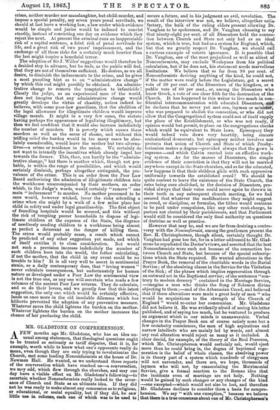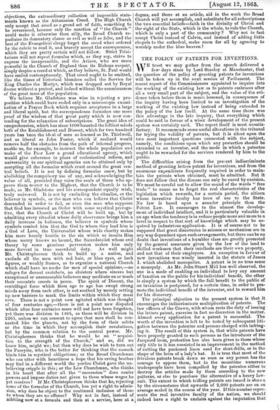MR. GLADSTONE ON COMPREHENSION.
AFEW months ago Mr. Gladstone, who has an idea un- usual among statesmen, that theological questions ought to be treated as seriously as tariff disputes, that it is, for example, worth while to know what one's opponents really do mean, even though they are only trying to revolutionize the Church, met some leading Nonconformists at the house of Dr. Newman Hall. He wanted, as we understand three reports of the conversation which have reached us—a conversation, we may add, which flew through the churches, and may one day have a visible effect on Mr. Gladatone's following—to ascertain whether Nonconformists really looked to the sever- ance of Church and State as an ultimate idea. If they did not he was ready to make almost any concession as to religious, or educational, or social equality, but if they did, he saw little use in reforms, each one of which was to be need to secure a future, and in his judgment an evil, revolution. The result of the interview was not, we believe, altogether satin- factory, the bulk of the ruling elders present allowing Dr. Vaughan to be spokesman, and Dr. Vaughan choosing to say that ninety-eight per cent, of all Dissenters held the connec- tion between Church and State not only bad as an ideal system, which is true, but bad as a system for England, which, but that we greatly respect Dr. Vaughan, we should call a curious example of coterie ignorance. It is possible that Dr. Vaughan, one of the most prejudiced as well as ablest of Nonconformists, may exclude Wesleyans from his political calculation, but if he does not, his statement needs marvellous limitations. We believe that so far from 98 per cent. of Nonconformists desiring anything of the kind, he could not, if the matter were really before the Legislature, get a secret vote of 30 per cent, of the Dissenters of the kingdom, or a public vote of 60 per cent., or, among the Dissenters who know Greek, a vote of one clear fifth for the destruction of the Church. It has happened to this writer to live much in con- fidential intercommunication with educated Dissentersal* he declares that he never yet met one, layman or who was prepared to abolish the connection, or who did not allow that the Congregational system could not of itself supply the place of the Establishment, or who was not ready, if opinion would but permit, to place on the congregations checks which would be equivalent to State laws. Episcopacy they would indeed vote down very heartily, being sincere ecclesiastical 'democrats, but episcopacy neither involves nor protects that union of Church and State of which Presby- terianism makes a dogma—provided always that the gown is supreme—and which Calvin erected into an effective work- ing system. As for the masses of Dissenters, the simple evidence of their conviction is that they will not be married anywhere except in the State churches, and as for the educated, how happens it that their children glide with such oppressive uniformity towards the established creed ? We should be quite content to leave the existence of the State Church, the rates being once abolidied, to the decision of Dissenters, pro- vided always that their votes could never again be thrown in their teeth in any subsequent church meeting, for we feel assured that whatever the modifications they might suggest in creed, or discipline, or formulas, the tithes would continue to be paid under compulsion, like any other rent-charge, to pastors not elected by their parishioners, and that Parliament would still be considered the only final authority on questions of doctrine as well as practice.
However that may be, and we are far from desiring a contro- versy with the Nonconformist, among the gentlemen present the Rev. H. Christopherson, though silent, certainly thought Dr. Vaughan had gone too far, for in a letter addressed to Mr. Glad- stone he repudiated the Doctor'sviews, and asserted that the best Nonconformists were such not because of the connection be- tween Church and State, but because of the special subscrip- tions which the State required. He wanted alterations in the Prayer Book, the removal of the charitable words in the Burial Service; of the absolving clause in the Service for the Visitation of the Sick; of the phrase which implies regeneration through an outward act in the Baptismal service; of the sentences "con- trary to modern decency" contained in the Marriage Service, —imagine a man who thinks the Song of Solomon divine objecting to them ;—and of the Athanasian Creed, and believed that if those alterations were made a great body of men "who would be acquisitions to the strength of the Church of England" would re-enter her communien. Mr. Gladstone did not believe it. He was evidently afraid of seeing his letter published, and of saying too much, but be ventured to produce an argument which to our minds is unanswerable. Verbal changes in the Prayer Book can of course satisfy none but a few crotchetty consciences, the men of high aspirations and narrow intellects who are mainly led by words, and almost any real alteration would reject as many as it included. A. clear denial, for example, of the theory of the Real Presence, which Mr. Christopherson would certainly ask, would eject more than he could bring in, the dogma of baptismal rege- neration is the belief of whole classes, the absolving power is in theory part of a system which hundreds of clergymen will not surrender, and there are, we hope, thousands of laymen who will not, by emasculating the Matrimonial Service, give a formal sanction to the Roman idea that the incidents even of marriage are not holy. Nothing would be gained by such changes or any changes of the kind —one excepted—which would not also be lost, and therefore Mr. Gladstone declines to consider them a basis for compre- hension. We say "with one exception," because we believe that there is a true consensus about one of Mr. Christopherees'a
objections, the extraordinary collection of impossible state- ments known as the A.thanasian Creed. The High Church only accept that creed as a grand act of faith, something to be reverenced, because only the sanction of "the Church" could make it otherwise than silly, the Broad Church re- pudiates its damnatory clause as evil as well as false, and the best of the Evangelical clergy forget the creed when ordered by the rubric to read it, and bravely accept the consequences, which they are pretty certain will not follow. Strict Trini- tarians will not repeat formulas which, as they say, strive to express the inexpressible, and the Arians, who are more powerful in the Church of England than its Bishops suspect, simply despise a creed at which, as they believe, St. Paul would have smiled contemptuously. That creed ought to be omitted, like the tissue of historical blunders called the Service for King Charles the Martyr, which was dropped out by Royal decree without a protest, and indeed without the consciousness of the great mass of the population.
We believe Mr. Gladstone was wise in rejecting a pro- position which could have ended only in a microscopic exami- nation of a Prayer Book which requires acceptance in a large and liberal spirit, but the correspondence furnishes one more proof of the wisdom of that great party which is now con- tending for the relaxation of subscriptions. The great idea of comprehension, which has since 1600 haunted the loftiest minds both of the Establishment and Dissent, which for two hundred years has been the ideal of men as learned as Dr. Thirlwall, and as liberal as John Foster, which if realized would remove half the obstacles from the path of internal progress, enable us, for example, to instruct the whole population and make of the Poor Law a grand educational agency, which would give coherence to plans of ecclesiastical reform, and universality to our spiritual agencies can be attained only by accepting all the formulas which crust around the great cen• tral beliefs. It is not by defining formulas anew, but by abolishing the compulsory use of any, and acknowledging the value of all, provided they raise the souls of those who ap- prove them nearer to the Highest, that the Church is to be made, as Mr. Gladstone and his correspondent equally wish, truly universal. It is not by excluding the ritualist, or the believer in symbols, or the man who can believe that Christ descended in order to fail, or even the man who supposes that God has invested an Order with some mystical preroga- tive, that the Church of Christ will be built up, but by admitting every ritualist whose daily observance brings him a daily increase in holiness, the believer in symbols whose symbols remind him that the God to whom they lead him is a God of Love, the Universalist whose wide charity makes him more keenly hostile to the sin which so insults Him whose mercy knows no bound, the Sacerdotalist whose evil theory by some gracious perversion makes him only more fervent in true sacerdotal duty. As well might Mr. Christopherson think to build up a nation, and exclude all the men with red hair, or blue eyes, or lank figures, or weakly frames, as to organize a national Church which shall have no nooks for men of special opinions,—no refuges for devout crotchets, no cloisters where sincere but exceptional or unreasonable believers may meditate on or teach their eccentric creeds in peace. The spirit of Dissent, the centrifugal force which from age to age has swept strong minds away from each other, is not soothed by merely setting up new barriers to mark the limits within which they must rove. There is not a point now agitated which was thought of four centuries ago,—there is not a point now disputed which after four centuries more will not have been forgotten, yet there was division in 1465, as there will be division in 2265, unless we can consent to agree that men shall be con- nected like the planets, not by the form of their orbits or the time in which they accomplish their revolutions, but by the common relation to the central power. Mr. Christopherson thinks that he would be an " acquisi- tion to the strength of the Church," and so, did we know him, might we; but then why does he wish to turn out the Puseyite, who is the better for thinking that the cassock binds him in mystical obligations; or the Broad Churchman who can utter with heartiness a hope that his erring brother may find in a different world the pardon Christ gave the un- believing cripple in this; or the Low Churchman, who thinks in his heart that after all the "succession" does confer powers and impose duties not given to those whose wages he yet receives? If Mr. Christopherson thinks that he, rejecting some of the formulas of the Church, has yet a right to admis- sion, why does he object to the continued inclusion of those to whom they are no offence? Why not in fact, instead of nibbling now at a formula and then at a service, here at a dogma, and there at an article, aid in the work the Broad Church will yet accomplish, and substitute for all subscriptions the two essential beliefs—faith in the divinity of Christ and the right of the State, which is the whole, to rule the Church, which is only a part of the community ? Why not in fact accept Christ instead of Calvin, and instead of adding little chapels to the cathedral, make room for all by agreeing to worship under the blue heaven ?































 Previous page
Previous page